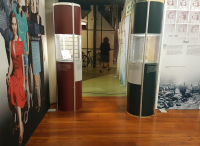
On 3rd March 2021 Anne Frank: Let Me Be Myself closed its doors to visitors at Motueka District Museum where its curator, Jen Calder, took time to reflect on the exhibition’s successful stay at her venue. When Anne Frank NZ first approached her about hosting Let Me Be Myself, back in 2019, she jumped at the chance to have an international exhibition in her small regional museum. Her instinct to do this proved right. During New Zealand’s summer months, Jen and her team were delighted to welcome many locals to the museum but even more visitors from around Aotearoa who came specifically to see the exhibition while they were staying in the Tasman region.
Over the past three years, Anne Frank: Let Me Be Myself has toured the country, mainly staying in larger city areas. Team Anne Frank NZ are delighted that the exhibition has been so well received in Motueka, much as it was in other more remote locations, like Whangerei and Waiouru. One visitor to the exhibition commented that it was ‘very appropriate to find this in a small town – somehow that makes things more meaningful’. Boyd Klap, Chairman of Anne Frank NZ, notes that, “when investigating this venue, we became convinced it would be a good location because enthusiastic curator, Jen Calder, was keen to host us in this South Island rural centre. She explained that Motueka was a hub of summer activity and many people coming through the town would stop to visit the exhibition. She was absolutely right and Anne Frank’s stay in Motueka’s provincial museum has been an outstanding success.”
Many visitors recorded their personal reflections about the exhibition in the museum comment book, revealing its powerful impact on them. There are numerous descendants of Dutch immigrants in New Zealand and one visitor noted a deeply personal connection with the exhibition: ‘my opa (grandfather) was a Dutch Jew taken by the Nazis. The story of 6 million Jews must be told. Thank you for bringing it here.’ A young visitor commented that ‘this experience taught me about how the Jewish people suffered. This is highly unfair’. Another visitor, who had been to Anne Frank House in Amsterdam, saw the value of learning this history today, noting that ‘everyone should be reminded of the horrors of war and the brutality of prejudice. We are all born equal.’
The final comment in the visitor book, written the day before the exhibition closed in Motueka, reinforces why we still need to tell Anne Frank’s story. ‘It was an honour to see this exhibition and, although Anne and so many others died in the concentration camps, her story is an inspiration for me, reinforcing how we should all appreciate our freedom.’
